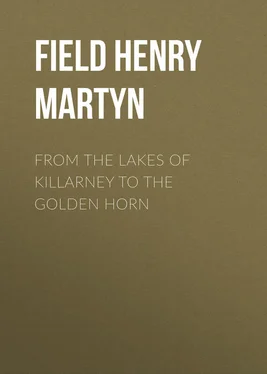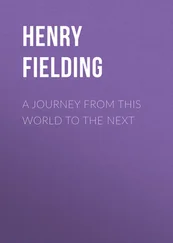Henry Field - From the Lakes of Killarney to the Golden Horn
Здесь есть возможность читать онлайн «Henry Field - From the Lakes of Killarney to the Golden Horn» — ознакомительный отрывок электронной книги совершенно бесплатно, а после прочтения отрывка купить полную версию. В некоторых случаях можно слушать аудио, скачать через торрент в формате fb2 и присутствует краткое содержание. Жанр: foreign_antique, foreign_prose, Путешествия и география, на английском языке. Описание произведения, (предисловие) а так же отзывы посетителей доступны на портале библиотеки ЛибКат.
- Название:From the Lakes of Killarney to the Golden Horn
- Автор:
- Жанр:
- Год:неизвестен
- ISBN:нет данных
- Рейтинг книги:5 / 5. Голосов: 1
-
Избранное:Добавить в избранное
- Отзывы:
-
Ваша оценка:
- 100
- 1
- 2
- 3
- 4
- 5
From the Lakes of Killarney to the Golden Horn: краткое содержание, описание и аннотация
Предлагаем к чтению аннотацию, описание, краткое содержание или предисловие (зависит от того, что написал сам автор книги «From the Lakes of Killarney to the Golden Horn»). Если вы не нашли необходимую информацию о книге — напишите в комментариях, мы постараемся отыскать её.
From the Lakes of Killarney to the Golden Horn — читать онлайн ознакомительный отрывок
Ниже представлен текст книги, разбитый по страницам. Система сохранения места последней прочитанной страницы, позволяет с удобством читать онлайн бесплатно книгу «From the Lakes of Killarney to the Golden Horn», без необходимости каждый раз заново искать на чём Вы остановились. Поставьте закладку, и сможете в любой момент перейти на страницу, на которой закончили чтение.
Интервал:
Закладка:
And after all, it is this human interest which is the great interest of any country – not its hills and valleys, its lakes and rivers alone , but these features of natural beauty and sublimity, illumined and glorified by the presence of man, by the record of what he has suffered and what he has achieved, of his love and courage, his daring and devotion; and nowhere are these more identified with the country itself than here, nowhere do they more speak from the very rocks and hills and glens.
Scotland, though a great country, is not a very large one, and such are now the facilities of travel that one can go very quickly to almost any point. A few hours will take you into the heart of the Highlands. We made in one day the excursion to Stirling, and to Loch Lomond and Loch Katrine, and felt at every step how much the beauties of nature are heightened by associations with romance or history. From Stirling Castle one looks down upon a dozen battle-fields. He is in sight of Bannockburn, where Bruce drove back the English invader, and of other fields associated with Wallace, the hero of Scotland, as William Tell is of Switzerland. Once among the lakes he surrenders himself to his imagination, excited by romance. The poetry of Scott gives to the wild glens and moors a greater charm than the bloom of the heather. The lovely lake catches, more beautiful than the rays of sunset,
"A light that never was on sea or shore,
The inspiration and the poet's dream."
Loch Katrine is a very pretty sheet of water, lying as it does at the foot of rugged mountains, yet it is not more beautiful than hundreds of small lakes among our Northern hills, but it derives a poetic charm from being the scene of "The Lady of the Lake." A little rocky islet is pointed out as Ellen's Isle. An open field by the roadside, which would attract no attention, immediately becomes an object of romantic interest when the coachman tells us it was the scene of the combat between Fitz James and Roderick Dhu. The rough country over which we are riding just now is no wilder than many of the roads among the White Mountains – but it is the country of Rob Roy! I have climbed through many a rocky mountain gorge as wild as the Trossachs, but they had not Walter Scott to people them with his marvellous creations.
A student of the religious part of Scottish history will find another interest here, as he remembers how, in the days of persecution, the old Covenanters sought refuge in these glens, and here found shelter from those pursuing rough-riders, Claverhouse's dragoons. Thus it is the history of Scotland, and the genius of her writers, that give such interest to her country and her people; and as I stood at the grave of John Wilson (Christopher North), I blessed the hand that had depicted so tenderly the "Lights and Shadows of Scottish Life," presenting such varied scenes in the cottage and the manse, in the glen and on the moor, but everywhere illustrating the patient trust and courage of this wonderful people. It is a fit winding-up to the tour of Scotland, that commonly the traveller's last visit, as he comes down to England, is to Abbotsford, the home of Walter Scott; to Melrose Abbey, which a few lines of his poetry have invested with an interest greater than that of other similar ruins; and to Dryburgh Abbey, where he sleeps.
Edinburgh is the most picturesque city in Europe, as it is cleft in twain by a deep gorge or ravine, on either side of which the two divisions of the city, the Old Town and the New Town, stand facing each other. From the Royal Hotel, where we are, in Princes Street, just opposite the beautiful monument to Walter Scott, we look across this gorge to long ranges of buildings in the Old Town, some of which are ten stories high; and to the Castle, lifted in air four hundred feet by a cliff that rears its rocky front from the valley below, its top girt round with walls, and frowning with batteries. What associations cluster about those heights! For hundreds of years, even before the date of authentic history, that has been a military stronghold. It has been besieged again and again. Cromwell tried to take it, but its battlements of rock proved inaccessible even to his Ironsides. There, in a little room hardly bigger than a closet, Mary Queen of Scots gave birth to a prince, who when but eight days old was let down in a basket from the cliff, that the life so precious to two kingdoms as that of the sovereign in whom Scotland and England were to be united, might not perish by murderous hands. And there is St. Giles' Cathedral, where John Knox thundered, and where James VI. (the infant that was born in the castle) when chosen to be James I. of England, took leave of his Scottish subjects.
At the other end of Edinburgh is Holyrood Castle, whose chief interest is from its association with the mother of James, the beautiful but ill-fated Mary. How all that history, stranger and sadder than any romance, comes back again, as we stand on the very spot where she stood when she was married; and pass through the rooms in which she lived, and see the very bed on which she slept, unconscious of the doom that was before her, and trace all the surroundings of her most romantic and yet most tragic history. Such are some of the associations which gather around Edinburgh!
I find here my friend Mr. William Nelson (of the famous publishing house of Nelson and Sons), whose hospitality I enjoyed for a week in the summer of 1867; and he, with his usual courtesy, gave up a whole day to show us Edinburgh, taking us to all the beautiful points of view and places of historical interest – to the Castle and Holyrood, and the Queen's Drive, around Arthur's Seat and Salisbury Crags. Mr. Nelson's house is a little out of the city, under the shadow of Arthur's Seat, near a modest manse, which has been visited by hundreds of American ministers, as it was the home of the late Dr. Guthrie. His brother, Mr. Thomas Nelson, has lately erected one of the most beautiful private houses I have seen in Scotland, or anywhere else. I doubt if there is a finer one in Edinburgh; and what gives it a special interest to an American, is that it was built wholly out of the rise of American securities. During our civil war, when most people in England thought the Great Republic was gone, he had faith, and invested thousands of pounds in our government bonds, the rise in which has paid entirely for this quite baronial mansion, so that he has some reason to call it his American house. So many in Great Britain have lost by American securities, that it was pleasant to know of one who had reaped the reward of his faith in the strength of our government and the integrity of our people.
When we reached Edinburgh both General Assemblies were just closing their annual meetings. I had met in Glasgow, on Sunday, at the Barony church (where he is successor to Dr. Norman Macleod), John Marshall Lang, D.D., who visited America as a delegate to our General Assembly, and left a most favorable impression in our country; who told me that their Assembly – that of the National Church – would close the next day, and advised me to hasten to Edinburgh before its separation. So we came on with him on Monday, and looked in twice at the proceedings, but had not courage to stay to witness the end, which was not reached till four o'clock the next morning! But by the courtesy of Dr. Lang, I received an invitation from the excellent moderator, Dr. Sellars, (who had been in America, and had the most friendly feeling for our countrymen,) to a kind of state dinner, which it is an honored custom of this old Church to give at the close of the Assembly. The moderator is allowed two hundred pounds to entertain . He gives a public breakfast every morning during the session, and winds up with this grand feast. If the morning repasts were on such a generous scale as that which we saw, the £200 could go but a little way. There were about eighty guests, including the most eminent of the clergy, principals and professors of colleges, dignitaries of the city of Edinburgh, judges and law officers of the crown, etc. I sat next to Dr. Lang, who pointed out to me the more notable guests, and gave me much information between the courses; and Dr. Schaff sat next to Professor Milligan. As became an Established Church, there were toasts to the Queen, the Prince of Wales, and her Majesty's Ministers. Altogether it was a very distinguished gathering, which I greatly enjoyed. I am glad that we in America are beginning to cultivate relations with the National Church of Scotland. As to the question of Church and State, of course our sympathies are more with the Free Church, but that should not prevent a friendly intercourse with so large a body, to which we are drawn by the ties of a common faith and order. Delegates from the National Church of Scotland will always be welcome in our Assemblies, especially when they are such men as Dr. Lang and Professor Milligan; and our representatives are sure of a hearty reception here. Dr. Adams and Dr. Shaw, two or three years since, electrified their Assembly, and they do not cease to speak of it. Certainly we cannot but be greatly benefited by cultivating the most cordial relations with a body which contains so large an array of men distinguished for learning, eloquence, and piety.
Читать дальшеИнтервал:
Закладка:
Похожие книги на «From the Lakes of Killarney to the Golden Horn»
Представляем Вашему вниманию похожие книги на «From the Lakes of Killarney to the Golden Horn» списком для выбора. Мы отобрали схожую по названию и смыслу литературу в надежде предоставить читателям больше вариантов отыскать новые, интересные, ещё непрочитанные произведения.
Обсуждение, отзывы о книге «From the Lakes of Killarney to the Golden Horn» и просто собственные мнения читателей. Оставьте ваши комментарии, напишите, что Вы думаете о произведении, его смысле или главных героях. Укажите что конкретно понравилось, а что нет, и почему Вы так считаете.












